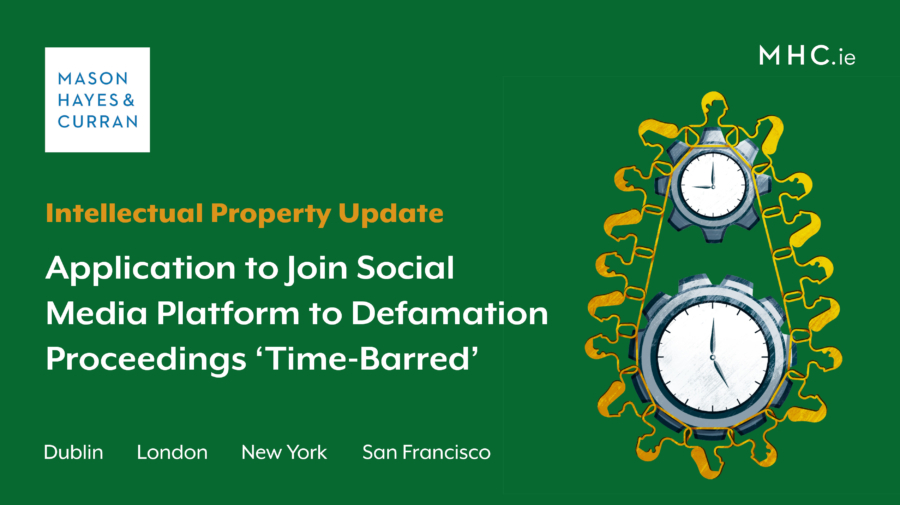Application to Join Social Media Platform to Defamation Proceedings 'Time-Barred'

A recent High Court ruling has refused to join Google as a co-defendant in a defamation case, citing the plaintiffs’ delay in bringing the application. The decision highlights the importance of timely action in defamation claims, particularly those involving online platforms like YouTube. With the case hinging on the Statute of Limitations, this ruling clarifies how time-barred claims affect the prosecution of online defamation claims in Ireland. Read the full article, written by our Intellectual Property team, to understand how this could impact similar future cases, especially when third-party platforms are involved.
A recent High Court decision in the case Gilroy v O’Leary [1] relates to an application to join Google Ireland Limited as a defendant to defamation proceedings. The plaintiffs, Ben Gilroy and Vincent Byrne, made the application under Order 15 Rule 4 of the Rules of the Superior Courts. The proceedings relate to allegedly defamatory statements made by the defendant, Ms O’Leary, in a video published to the video-sharing platform YouTube, a service provided by Google. The video was posted in June 2018 and is said to suggest that the plaintiffs promoted the use of Miracle Mineral Solution as a cure for autism, cancer and AIDS. This case is a useful guide on when joinder to defamation proceedings can be statute barred where proceedings must normally issue within one year.
Background
Proceedings were issued by way of a plenary summons in June 2018 against the Defendant, Ms O’Leary. The plaintiffs issued a Notice of Motion seeking to join Google in March 2021. However, they were required to file a new motion, as they had not submitted a Notice of Intention to Proceed before issuing the 2021 motion. A second motion was subsequently filed in December 2022, and the current decision pertains to this latter motion.
The jurisdiction to refuse to join a proposed co-defendant is a very narrow one and the Court accepted that an application should be refused in limited circumstances. However, the High Court relied on the previous decisions of Hynes v Western Health Board [2] and O’Connell v Building and Allied Trades Union and Others [3]. It found that the test for refusal was satisfied in circumstances where the claim against Google was manifestly time-barred under the provisions of section 11 of the Statute of Limitations 1957. The Court noted that if successfully joined, Google would rely on this argument and could not be prevented from doing so.
Statute of Limitations 1957
Section 11(2)(c) of the 1957 Act states that a defamation action shall not be brought after the expiration of:
- One year, or
- A longer period, as directed by the court, may be allowed but cannot exceed two years from the date the cause of action arose
Section 11(3B) states that for the purposes of bringing a defamation action within the meaning of the Defamation Act 2009, the date of accrual of the cause of action shall be:
- The date on which the defamatory statement is first published, and
- Where the statement is published through the medium of the internet, the date on which it is first capable of being viewed or listened to through that medium
On this basis, the date the cause of action accrued was 23 June 2018. As the Notice of Motion to join Google was not brought within the limitation period, the cause of action against Google was statute barred.
Date of publication of the video by Google
The plaintiff sought to argue for a later date of publication. They proposed that this date was the point when they requested Google to take down the material and Google refused. This correspondence took place between March 2021 and October 2022.
The plaintiffs relied on a number of cases in support of the proposition that a person may become a publisher of a defamatory statement even if they were not involved in its initial publication. Cited instances include where the publisher refused to take steps to remove the statement after the publisher received a request to remove the content from its platform. Google accepted that it was possible to become a publisher of defamatory statements, including statements on the internet, in certain circumstances. However, Google argued that the question was not whether Google became a publisher of the video but, assuming it became a publisher, when the claim accrued and the time began to run for the purpose of the Statute of Limitations.
The Court accepted Google’s argument on the basis that section 11(3B) is clear that the cause of action accrues when the material is first capable of being viewed or listened to on the internet, and not on the date there was a refusal to take down the material. Therefore, even if Google were deemed a publisher of the video from the date it refused to remove it, this would not change the outcome. The law still considers the cause of action to begin when the video first became viewable or audible online, which was on 23 June 2018.
Comment
This decision offers useful clarification on the prosecution of online defamation claims in Ireland. It is especially relevant when the publication involves third-party providers, such as social media platforms:
- The cause of action accrues from the date the content is “first capable of being viewed or listened to” on the internet. This date is not impacted by a later request to remove the content and a subsequent refusal
- Although the default position is that parties should generally be joined, the court has the authority to refuse the application. This can occur when the claim against the proposed co-defendant is statute-barred, and the proposed co-defendant raises that argument in defence of the application
- Plaintiffs should be careful to initiate proceedings against all relevant parties from the beginning. This is especially important in defamation cases, where the limitation period is relatively short, ranging from one to two years
For more information and expert advice on successfully defending defamation claims, contact a member of our Intellectual Property team.
People also ask
What is the statutory limitation period for defamation actions in Ireland? |
The statutory limitation period for defamation actions in Ireland is one year from the date the cause of action accrued or up to a maximum of two years where the court directs that an extension is appropriate. |
What is a Notice of Intention to Proceed in Ireland? |
Order 122 Rule 11 of the Rules of the Superior Court provides that in any case in which there has been no action taken for one year, the party who wishes to progress the case shall give a month’s notice to the other party of his or her intention to proceed. |
[1] [2024] IEHC 349
[2] [2006] IEHC 55
[3] [2012] IESC 36
Share this:





